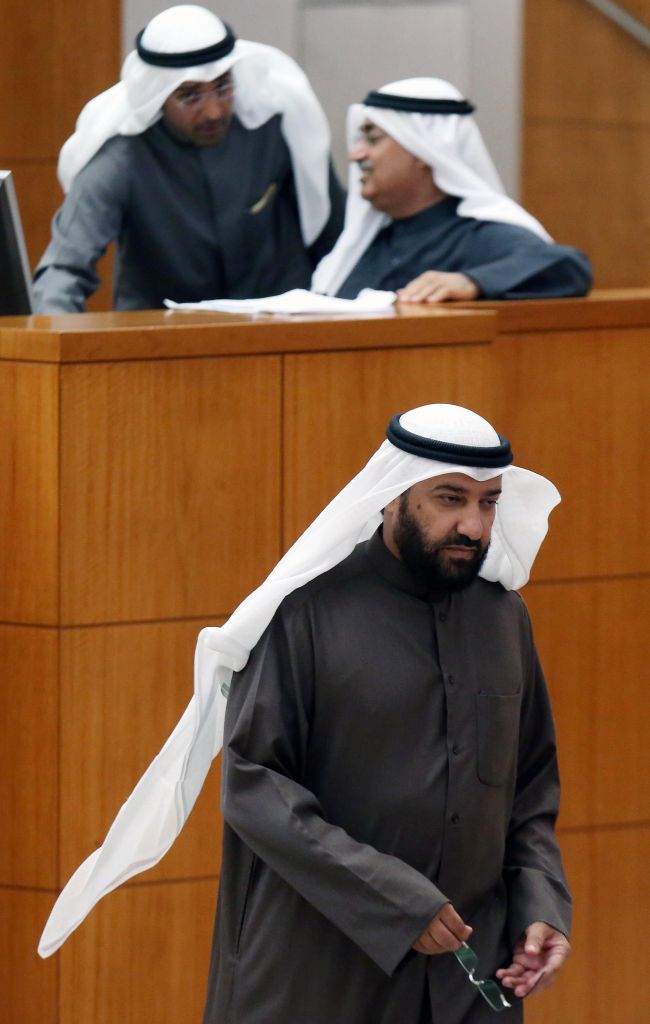KUWAIT CITY (AFP) ― OPEC has no plans to intervene in the oil market to shore up sagging crude prices, the Kuwaiti oil minister said Tuesday, as Brent crude breached the $60 mark.
“At OPEC’s meeting in November, we took two decisions,” Ali al-Omair said at a lecture in Kuwait City.
“The first was to keep the production ceiling unchanged and the second to hold the next meeting in June. So far, nothing has changed and there are no calls for holding an emergency meeting,” Omair said.
He declined to answer a question on what price would force the Organization of Petroleum Exporting Countries to step in to bolster the market.
“As of now, there are no plans. We will talk about it when it comes,” the minister said in response to a question on whether OPEC would meet if prices drop to $40 a barrel.
The Kuwaiti minister said the current slide in oil prices had “surpassed all forecasts,” which initially predicted a slight drop in crude prices.
 |
Kuwaiti oil minister Ali al-Omair (bottom) attends a Parliamentary session at Kuwait’s national assembly in Kuwait City on Tuesday. (AFP-Yonhap) |
He said excess supplies in global markets had increased from 1.2 million barrels per day when OPEC met last month to 1.8 million bpd now.
Oil prices were also under pressure because “many world markets are saturated” with oil.
Earlier on Tuesday, Omair said OPEC should stick by its decision to maintain production levels despite sliding prices.
“There is no need for OPEC to change its decision” taken on Nov. 27, the minister told reporters outside parliament.
“Kuwait believes the decision was correct and we should continue with it,” he said, brushing aside calls for OPEC to take action.
The decision was not aimed at triggering “a price war,” he added.
Brent crude dived to a five-year low under $60 as markets were rocked by shrinking Chinese manufacturing output and economic turmoil in Russia.
London’s benchmark contract Brent North Sea crude for January slumped as low as $58.50 per barrel ― the lowest since May 2009.
It climbed back to $59.83 in late trading, still down $1.23 from Monday’s close.
New York’s West Texas Intermediate for January hit a similar five-year low at $53.60, although prices climbed back to $55.79 in midday trading.
Oil prices have plummeted by almost 50 percent since June, with losses picking up after OPEC’s decision to hold its output ceiling in an oversupplied market.
Sentiment was also hit Tuesday by the Russian central bank’s shock move to raise interest rates to 17 percent, a move which failed to arrest the slide of the ruble.
The minister hinted that oil prices could slide further.
“Undoubtedly many of the shale oil and sand oil companies are producing at a cost higher that current oil prices,” Omair said.
“It depends on the capability of these producers to continue pumping at such a low price,” he said.
Omair said OPEC pumps around 30 percent of global supplies and “we cannot reduce this level.”







![[Today’s K-pop] Blackpink’s Jennie, Lisa invited to Coachella as solo acts](http://res.heraldm.com/phpwas/restmb_idxmake.php?idx=644&simg=/content/image/2024/11/21/20241121050099_0.jpg)
